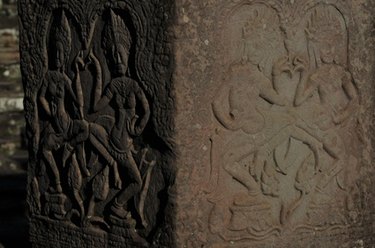Things You'll Need
Vacuum cleaner (optional)
White glue (optional)
Tarps, plastic sheeting or other floor and furniture protection
Painter’s tape
Screwdriver
Primer (lightly tinted)
Brushes and/or paint roller and pan or paint sprayer
Paint for base color
Paint for highlight color (optional)
Sponge or small brush (optional)

"Anaglypta" is Greek for "raised design" and the wallpaper has been embossed so that it's covered in textured patterns. It's used to cover defects in walls and ceilings as well as for the decorative and architectural element it adds to the room's décor. Anaglypta wallpaper can mimic any surface, from wainscoting to carved marble to punched tin. It is white and looks elegant left unadorned but it is designed to be painted.
Step 1
Allow newly hung paper dry for at least 48 hours before you apply the first coat of paint. Vacuum thoroughly to remove any dust; use white glue to fasten any loose seams or corners.
Video of the Day
Step 2
Take down any pictures or other wall decorations. Remove switch plates, outlet covers and other hardware from the walls with the screwdriver. Remove draperies. Tape the edges of baseboards, windows and door moldings and ceiling with the painter's tape. Cover the floors and furniture with tarps or plastic sheeting.
Step 3
Brush, roll or spray primer over the entire surface of the wallpaper. When it has dried, check carefully for missed areas; touch up any bare spots. Allow the wallpaper to dry thoroughly, at least 12 hours.
Step 4
Brush, roll or spray paint over the entire surface of the wallpaper using your base color. Allow to dry thoroughly, at least 12 hours.
Step 5
Paint the raised design carefully with the highlight color using a sponge or small brush. Allow to dry thoroughly.
Step 6
Remove the tarps or plastic sheeting from the floors. Peel the painter's tape carefully from the woodwork and ceiling. Replace the switch plates, outlet covers and hardware. Rehang draperies, pictures and other wall ornaments.
Tip
Since anaglypta paper is white, use a lightly tinted primer. It’s more challenging to paint textured paper and the color contrast will highlight any spots you missed. Anaglypta wallpaper can be very porous, which makes it “thirsty.” Though some experts say that priming is not necessary, it’s a good idea to seal the paper so that it won’t take several coats of paint to completely cover it. Using metallic paint or leaf on anaglypta paper can create the effect of pressed metal. This technique is often used to create a faux tin ceiling or backsplash.
Warning
Do not press too hard with the roller or the brushes when you’re painting anaglypta wallpaper. It will flatten out the raised portions of the paper. Better yet, use a paint sprayer. Monitor children carefully around paint and painting materials.
Video of the Day